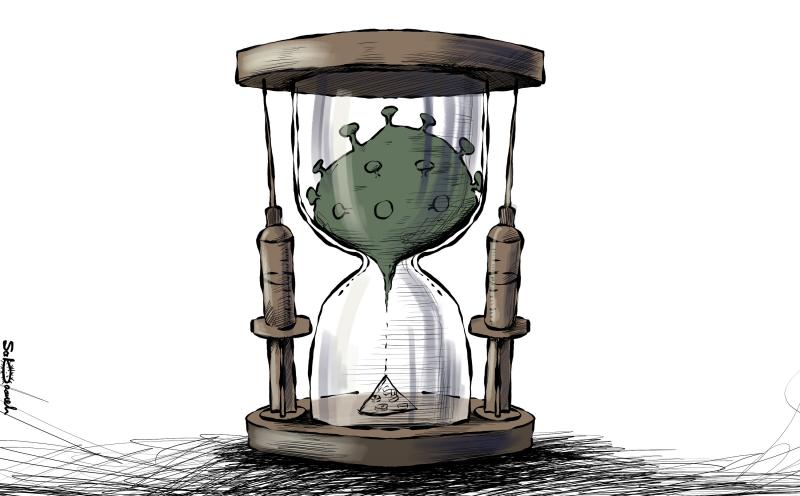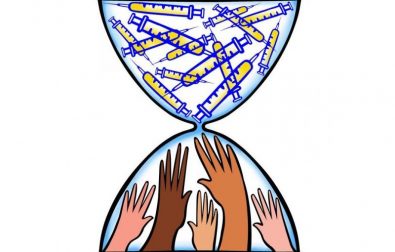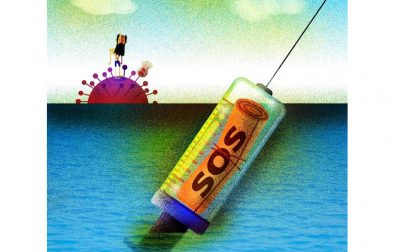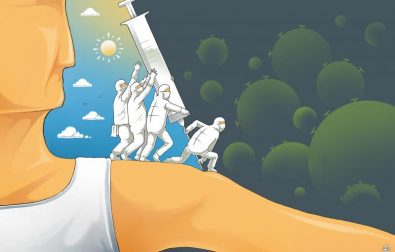Alexandre Henrique de Paula, an undocumented man in Clonsilla, didn’t watch, listen or read the news to find out how he could access the Covid-19 vaccine.
“As my English is in progress. I just asked the people I was around,” said de Paula. This meant his sister and friends, he says.
When de Paula’s turn to be vaccinated came around, his sister Renata booked him an appointment, and de Paula showed up. It was easy, he said.
👉All the articles from this investigation
If he had been following Irish government announcements, he might have found it difficult to understand whether they applied to undocumented residents like him.
Overall, Ireland has scored relatively highly on metrics such as making identification and residency requirements clear, providing access to marginalised groups, and guaranteeing privacy, according to a scorecard produced by Lighthouse Reports, an investigative nonprofit newsroom working with Europe’s leading media. But like many other European countries, its policies on vaccinating undocumented people were “confused”, or unclear in the publicly available documents.
According to a recent press release, the Department of Justice estimates that there may be about 17,000 undocumented people living in Ireland. Like the policies themselves, the proportion of this population that was able to access the vaccine is a mystery.
Encouraging vaccination uptake
Neil Bruton, campaign development worker at the Migrants Rights Centre Ireland (MRCI), says that he thinks a large number of those who are undocumented have been vaccinated, based on MRCI’s interactions throughout the pandemic.
When Covid-19 struck, the Health Service Executive (HSE) put up information firewalls to stop data swaps between itself and immigration authorities, with the aim of encouraging undocumented people to get vaccinated. Ireland was one of the few countries on the scorecard to guarantee that data would not be shared beyond health authorities.
The firewalls helped to dampen fears on accessing the vaccine and the implications for employment, he said. “We think it should also be in place for things like reporting a crime.”
No need to register
When booking online, people needed a social security (PPS) number, which some people who are undocumented don’t have. But there were ways around that, said Bruton. In this case undocumented people could book without the number over the phone rather than book online. MRCI helped many with that process, which they did not know about or were not able to navigate without assistance.
A health-ministry spokesperson said that it has publicised that there is no need for a PPS number to get jabbed, but that it has not recorded the number of people who booked an appointment by phone.
On going to get his jab, to help him explain why he had no PPS number De Paula relied on a letter from the Department of Justice that said his application to get legal status was being processed.
Weak communication strategy
While undocumented people could access the vaccine – thanks to the firewall and a way around needing a PPS number – these policies may have been publicised through channels that failed to reach target populations.
The Irish government didn’t explicitly mention the undocumented – or other groups like the homeless or prisoners – in its national vaccination policy document. Instead, it talked in more general terms about “all residents”.
Lighthouse Reports evaluated whether the language used in national vaccine strategies could still be easily “interpreted as including undocumented populations” – for example, with phrases like, “everyone in the country or regardless of migration status”. And Ireland did not use that language in documents.
Ireland did score higher that average, among the 18 European countries looked at, when it came to how public officials addressed undocumented people in public statements. Its scorecard cited Minister of Health Stephen Donnelly saying that, “It is important that undocumented migrants are encouraged and facilitated to take-up the Covid-19 vaccine.”
But De Paula and another Brazilian undocumented man – who asked not to be named because his status was not known to the government – both say they don’t recognise themselves in the government’s healthcare communications.
Bruton of MRCI said, “It’s very important for someone to say, ‘They are talking about me there.’ Rather than, ‘Oh they’re talking about somebody else,’ in order to establish trust.”
In response to a Freedom of Information Act request, a Department of Health spokesperson said they could not find any internal guidelines, HSE policies or internal communications which expressly covered vaccination for undocumented people.
“It’s very important for someone to say, ‘They are talking about me there.’ Rather than, ‘Oh they’re talking about somebody else,’ in order to establish trust.”
Neil Bruton, Migrants Rights Centre Ireland
Bruton says leaving out the word “undocumented” from conversations around pandemic measures and healthcare isn’t helpful. “We would like to see specific message for undocumented people in simple clear language across all media.”
A HSE spokesperson said, in response to a query about why it chose to avoid using the term “undocumented” in the national vaccination policy, that questions about the Irish government’s communication campaigns did not concern them.
Messaging across languages
In the Lighthouse Reports analysis, Ireland scored well above average among European countries for developing official policies for minority communities. A spokesperson for the HSE said that its vaccine information material is available in 27 languages, both online and in print and video.
Graham Clifford, CEO of Translate Ireland, was part of the effort to produce vaccine information via video quickly. He says he set up the venture from a corner of his bedroom last year out of sheer necessity. Not long into the health crisis, he and his wife, who is a GP, realised that language barriers were stopping asylum-seekers who they knew from accessing Covid-related information. “So, I was on to the HSE saying, what are you doing? Or what’s the plan for communication? And of course, there was no plan,” he said.
Then there was an outbreak in a meat factory near where they live, and around 200 workers, a large number of them young Brazilians, tested positive for the virus in one day. “Public health started ringing us up saying, what do we do? Because we’d done a few videos,” said Clifford. The HSE commissioned Clifford to do more videos, in more languages.
“The big problem is that we break our back making the videos, get them all ready, send them to HSE, the HSE takes weeks and then they might put them up on their website. And they sit on the website, they’re not shared.”
The HSE spokesperson pointed to distribution via YouTube, radio, newspapers and other channels.
Assurances beyond the pandemic?
Bruton says the pandemic has cracked open a public conversation around the needs of vulnerable people, like the undocumented, and that it should be acknowledged that the government listened. “I mean, in practice it proved quite difficult, but at least there was a firewall between the Department of Social Protection and Immigration,” he said.
He added that undocumented people have also been able to access the pandemic unemployment payment (PUP). An HSE spokesperson did not directly respond to a query asking if it intends to keep the data firewalls in place for healthcare after the pandemic.
👉 Original article at Dublin Enquirer
Was this article useful? If so we are delighted!
It is freely available because we believe that the right to free and independent information is essential for democracy. But this right is not guaranteed forever, and independence comes at a cost. We need your support in order to continue publishing independent, multilingual news for all Europeans.
Discover our subscription offers and their exclusive benefits and become a member of our community now!















